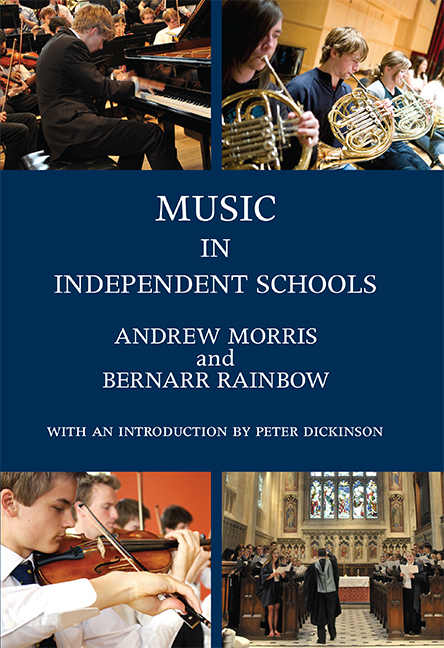Book contents
- Frontmatter
- Contents
- List of Plates
- General Editor's Foreword
- Editor's Introduction
- Biographical Notes
- List of Abbreviations
- PART I Studies from Music and the English Public School (1990)
- PART II The New Millennium
- SOME INDEPENDENT SCHOOLS IN THE NEW MILLENNIUM
- FURTHER TRADITIONS
- 8 Girls' Schools
- 9 The Earliest Years: The Work of Sam Dixon at Brighton College
- 10 Preparatory Schools
- 11 Choir Schools
- 12 Specialist Schools
- ORGANISATIONS
- Index
- Appendix
8 - Girls' Schools
from FURTHER TRADITIONS
Published online by Cambridge University Press: 05 October 2014
- Frontmatter
- Contents
- List of Plates
- General Editor's Foreword
- Editor's Introduction
- Biographical Notes
- List of Abbreviations
- PART I Studies from Music and the English Public School (1990)
- PART II The New Millennium
- SOME INDEPENDENT SCHOOLS IN THE NEW MILLENNIUM
- FURTHER TRADITIONS
- 8 Girls' Schools
- 9 The Earliest Years: The Work of Sam Dixon at Brighton College
- 10 Preparatory Schools
- 11 Choir Schools
- 12 Specialist Schools
- ORGANISATIONS
- Index
- Appendix
Summary
In 1838 ‘five little girls sat on five wooden benches, specially made for them, at the Opening Meeting of the School and Home for Missionaries' Daughters … in the charming village of Walthamstow, five miles from London.’ Later, in the 1850s, former scholars of Walthamstow Hall would recall their appreciation of a Miss Hale for her ‘amiable and consistent conduct’. For seven years from 1842 Miss Hale had acted as music teacher, and it is known that she concentrated on singing because it was impossible to cope with the demands for learning piano. Indeed, singing must surely have been the prime musical activity in many schools, whether in chapel or the local church, and this was certainly the case in many of the girls' schools which have kindly given me an insight into their music provision.
Boarding schools for girls arose during the second half of the nineteenth century and, as far as we can tell, most provided some sort of musical education. Today some schools have opted for weekly boarding and so not everywhere can boast weekly Sunday chapel choirs. Sadly we read that only a few new boys' schools at this time provided music, mainly in their great daily chapel service, whereas the long-established places like Eton, Winchester, Westminster and Harrow appear to have concentrated on singing, just like many of the older girls' schools.
- Type
- Chapter
- Information
- Music in Independent Schools , pp. 299 - 308Publisher: Boydell & BrewerPrint publication year: 2014

